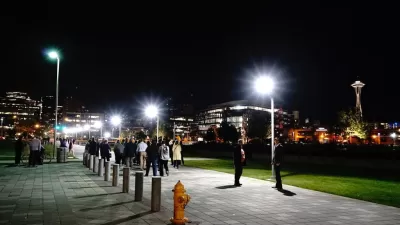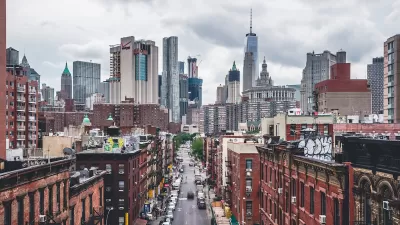What is the apt metaphor for a city? Machines? Insect colonies? In a new paper, physicist Luis Bettencourt says that if we look to the function of cities we find that they're essentially social reactors that obey universal mathematical parameters.
What is the best way to conceptualize a city, asks Emily Badger. "Bettencourt, in a paper published today in the journal Science, finally offers up an answer that borrows a bit from physics, economics, sociology, biology and a handful of other disparate reaches of science. We can never get the analogy quite right, he says, because cities are a thing that is found nowhere else in nature."
"At their most fundamental, cities are not really agglomerations of people; they’re agglomerations of connections between people," explains Bettencourt, a physicist with the Santa Fe Institute, in his paper. "All of their other properties – the roads we build to reach each other, the density required to do that, the economic products and ideas we create together – derive from this fact."
"Cities, Bettencourt has concluded, are a 'special kind of social reactor.' And, as such, they all evolve according to a small set of basic principles that can be used to predict the average social, spatial and infrastructure properties of any metropolitan place," says Badger. "Bettencourt’s theoretical framework suggests that a kind of optimal city exists when we have the most social interaction – and social and economic output coming from it – with the least cost of connecting people and goods and ideas to each other."
"The idea that cities are governed by some universal rules of math may make it sound like the urban planner has little control. But, in fact, Bettencourt sees the planner’s job to try to steer cities toward that optimal point (G*) on the above graph. Beyond that point, the number of social interactions in a city can still grow, but the cost of them rises faster than the benefit."
FULL STORY: Scientific Proof That Cities Are Like Nothing Else in Nature

Planetizen Federal Action Tracker
A weekly monitor of how Trump’s orders and actions are impacting planners and planning in America.

Restaurant Patios Were a Pandemic Win — Why Were They so Hard to Keep?
Social distancing requirements and changes in travel patterns prompted cities to pilot new uses for street and sidewalk space. Then it got complicated.

Map: Where Senate Republicans Want to Sell Your Public Lands
For public land advocates, the Senate Republicans’ proposal to sell millions of acres of public land in the West is “the biggest fight of their careers.”

Maui's Vacation Rental Debate Turns Ugly
Verbal attacks, misinformation campaigns and fistfights plague a high-stakes debate to convert thousands of vacation rentals into long-term housing.

San Francisco Suspends Traffic Calming Amidst Record Deaths
Citing “a challenging fiscal landscape,” the city will cease the program on the heels of 42 traffic deaths, including 24 pedestrians.

California Homeless Arrests, Citations Spike After Ruling
An investigation reveals that anti-homeless actions increased up to 500% after Grants Pass v. Johnson — even in cities claiming no policy change.
Urban Design for Planners 1: Software Tools
This six-course series explores essential urban design concepts using open source software and equips planners with the tools they need to participate fully in the urban design process.
Planning for Universal Design
Learn the tools for implementing Universal Design in planning regulations.
Heyer Gruel & Associates PA
JM Goldson LLC
Custer County Colorado
City of Camden Redevelopment Agency
City of Astoria
Transportation Research & Education Center (TREC) at Portland State University
Camden Redevelopment Agency
City of Claremont
Municipality of Princeton (NJ)





























